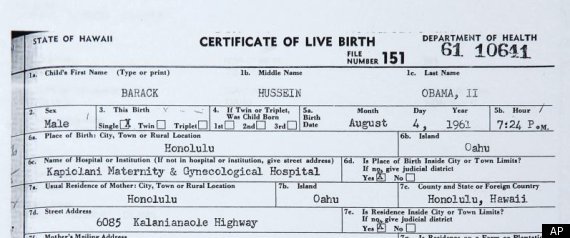Does this mean the so-called "birther" debate can finally die?
Two years after he began his presidency, 3.5 years after launching onto the national stage, and nearly 50 years after he was born on decidedly U.S. soil, President Barack Obama has had to release his official birth certificate (again) to combat claims that he is not American.
Huh? What? Come again?
Sadly, the poorly-veiled racist attack did end back in 2008 when questions of President Obama's national origin were first raised. The initial release of a photo of his birth certificate only cause more alarm and panic because - how could it be?! - his middle name was Hussein. This fueled "jokes" and "accidental slips of tongue" of 'Osama' for years to come.
So what will the birthers and their newest cheerleader, Donald Trump, do now? Will the release of the President's birth certificate, a document issued every day to thousands but somehow seen as inconceivably real because of the color of his skin, the origin of his middle name, and the homes of his ancestors - will this quiet the questions once and for all? Doubtful. Public response to the birthers has been incredulous for many years now. For many, the President's birthplace was never a question or concern, while for others, it has continually resurfaced, as if it is impossible to believe that a multi-racial, dark-skinned man with an informed world-view and well-traveled family has any place in the power structure of the United States. And based on the collective history of this country, it is a bit amazing even today that he does.
So no matter what public awareness of the truth is or what the response has been for many years, the birther camps are going to stay steadfast in their disbelief of the President's citizenship, because it's not about the birth certificate at all. The birthers' assertions imply that President Obama - and other folks like him - do not belong in America, simply could not have originated here in this White-skinned, wealthy male country. The undercurrents of racism and hatred are clear, and can't be combated with common sense or legal documentation. The heart of racism is emotionally-based, and is not founded on logic or sense.
Fighting emotion and hate with papers and proof is simply keeping the conversation going. It will never be enough, and no one should have to continually prove their worth or value to those who do not want to believe.

